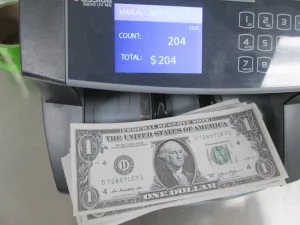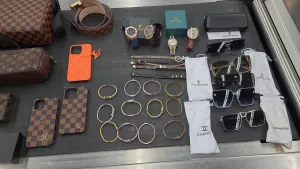CHICAGO–U.S. Customs and Border Protection (CBP) officers at Chicago O’Hare International Airport were busy on February 1. Officers at the International Mail Facility (IMF) stopped over $76,000 of counterfeit currency, while officers performing baggage inspections inside the passenger terminal seized counterfeit merchandise, that would have had a Manufacturer’s Suggested Retail Price (MSRP) over $465,000 if it was genuine.
Overnight on February 1, officers at the IMF held five parcels for inspection that were arriving from different shippers in China. The officers inspected the shipments to determine the admissibility of the parcels and its contents. All five shipments contained counterfeit currency with denominations ranging from $1 to $100 bills totaling $76,054.
The shipments were heading to Houston and Mission, Texas, Greenbush, Minnesota, Oklahoma City, Oklahoma, and Morris, Illinois. Even though these counterfeits are marked and were going to be used as prop money, it is a violation of federal law to reproduce currency. Violators can be arrested. The counterfeit currency was turned over to Homeland Security Investigations and U.S. Secret Service for investigation.
“Today, criminals have relatively easy access to the technology, equipment and know-how required for counterfeiting. It is a lucrative business which is often used to finance criminal activities,” said Ralph Piccirilli, Acting Area Port Director-Chicago. “Criminal groups continuously target our citizens, businesses and the security of the United States financial structure hoping to make a quick buck and damage our economic system. Our officers are there to stop that threat to our nation.”
According to the U.S. Secret Service, special agents, and investigative analysts from around the country continue to work closely with state and local law enforcement partners to minimize risks by informing the public and by apprehending those responsible for passing counterfeit currency. Both consumers and retailers can protect themselves from inadvertently receiving counterfeit currency through scrutinizing banknotes during transactions.
While this seizure was wrapping up, another was unfolding inside Terminal 5. A returning U.S. citizen was referred to secondary baggage. There he stated he had purchased $1,000 in items while abroad in Turkey for family and friends. Officers inspected the baggage and found 61 designer watches, clothing, handbags, sunglasses, and jewelry. Had these items been real, the MSRP would have been $465,798.
“Counterfeit goods pose a very real threat to the safety and economic prosperity of the American people,” said LaFonda D. Sutton-Burke, Director, Field Operations-Chicago Field Office. “CBP will continue to use all methods at its disposal to ensure items entering the U.S. do not harm Americans and to foster a fair and competitive trade environment for American manufacturers.”
Counterfeiting and intellectual property rights piracy cost the U.S. economy between $200 billion and $250 billion per year, are responsible for the loss of 750,000 American jobs, and pose a threat to health and safety. CBP and HSI protect the intellectual property rights of American businesses through an aggressive Intellectual Property Rights enforcement program, safeguarding them from unfair competition and use for malicious intent while upholding American innovation and ingenuity. Suspected violations can be reported to CBP here.
CBP has established an educational initiative to raise consumer awareness about the consequences and dangers that are often associated with the purchase of counterfeit and pirated goods. Information about the Truth Behind Counterfeits public awareness campaign can be found at https://www.cbp.gov/FakeGoodsRealDangers. The agency encourages anyone with information about counterfeit merchandise illegally imported into the United States to submit an e-Allegation. The e-Allegation system provides a means for the public to anonymously report to CBP any suspected violations of trade laws or regulations related to the importation of goods in the U.S.
CBP conducts operations at ports of entry throughout the United States, and regularly screens arriving international passengers and cargo for narcotics, weapons, and other restricted or prohibited products. CBP strives to serve as the premier law enforcement agency enhancing the Nation’s safety, security, and prosperity through collaboration, innovation, and integration.
Follow us on Twitter @CBPChicago @DFOChicago and @HSIChicago.



